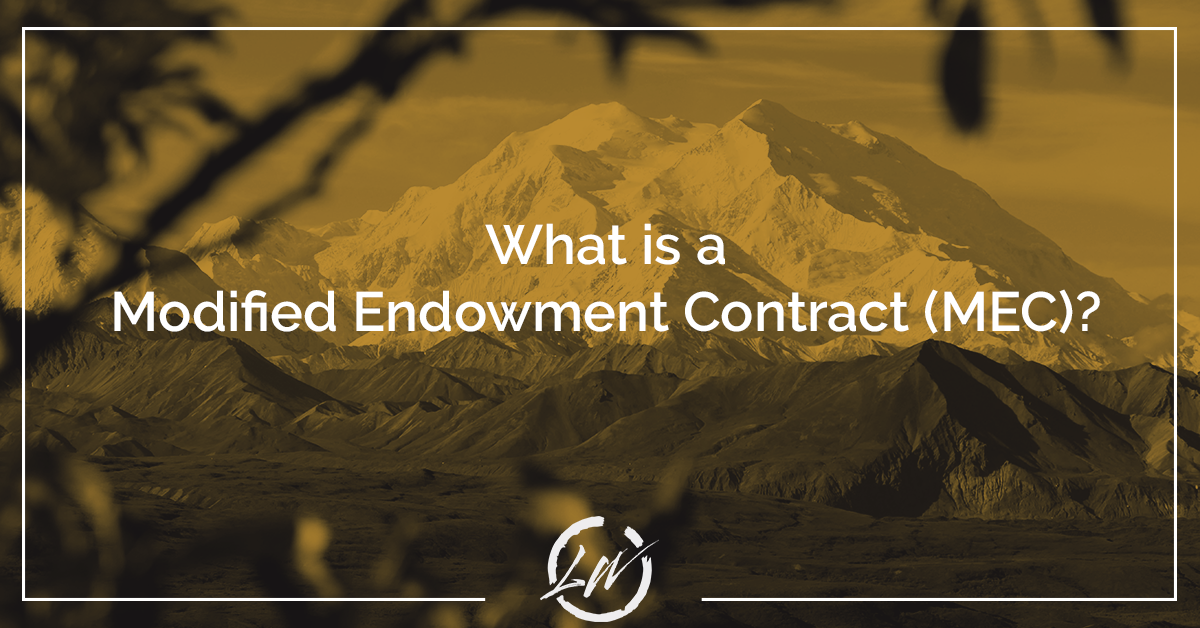As you advance your knowledge as you use the infinite banking concept, you will likely encounter the term Modified Endowment Contract (MEC). Although it is likely not to play a massive role in becoming your own banker, it is essential to understand what it is and its potential impact. This article will help explain this term and its relation to the infinite banking concept.
Definition of Modified Endowment Contract
A Modified Endowment Contract (MEC) is a type of life insurance subject to taxation in the United States. This happens when the cumulative premiums paid into a policy exceed the cash value within it. Essentially, there is more growth within the policy than what you put in. Therefore, you now must pay taxes on any withdrawals made instead of being treated as non-taxable income. (See what Wikipedia says about a MEC.)
Brief History of Modified Endowment Contract
Cash-value life insurance policies as a financial instrument date back to the early 18th century. However, it wasn’t until the 1970s that many life insurance companies began use the advantages of tax-free growth within these policies.
Policy owners were able to withdraw interest and principal as a tax-free loan. Essentially, they could use their policies to minimize or decrease taxable income and liabilities. This became a popular tool for many, allowing the policy to act as a tax shelter.
The U.S. Congress did not allow that policies should be used in this way, so it passed the Technical and Miscellaneous Revenue Act of 1998 (TAMRA). With a MEC, taxation is based on a first-in-first-out (FIFO) basis.
Before TAMRA, this meant that contributions to the policy for a tax-free return were taken out before earnings. Now, FIFO (in relation to MEC) means that interest or gains come out of a policy first, then you get the principal back. Therefore, anything that exceeds gains is taxable, and the policy becomes a MEC. Essentially, TAMRA placed limits on how much could be paid into the policy to be tax-free.
How to create a Modified Endowment Contract
A Modified Endowment Contract is most often created in two ways. One of the most common ways to create one is through a single paid premium; this means that you only pay a premium once. This would automatically become a MEC.
Another way to create a Modified Endowment Contract is when more money is put into paid-up additions than what was paid as the premium. This, too, will often automatically become a Modified Endowment Contract.
Modified Endowment Contract and Infinite Banking
In general, when creating your own bank, it is best to avoid a MEC. Therefore, the primary connection between MEC and infinite banking is how to utilize insurance policies so that they do not turn into a MEC. This concept is discussed by hosts Holly Reed and Nate Scott in Living Wealth’s Dollars and Nonsense podcast, Episode 108, called: What You Need to Know About Modified Endowment Contracts.
In this episode, Nate and Holly describe what a Modified Endowment Contract is and how it applies to infinite banking. One of the cornerstones of infinite banking is that your money can ultimately grow tax-free. If the policy becomes a Modified Endowment Contract, that is not possible. Therefore, they discuss how many are worried about this happening accidentally. Although this is unlikely, they explain how this can be avoided.
“When we’re building out a policy, we want to produce for our clients as much cash value as we possibly can be based on the premium they’re paying,” explained Nate.
Buying as little death benefit as possible is the optimal way to do this. However, if you buy too little death benefit, it automatically becomes a MEC. Therefore, you must buy just enough death benefit to pay the desired premium, and the paid-up additions riders will produce most of the cash value. However, there is a limit to this that can be done, the MEC limit. Therefore, you need to determine how much premium you need to pay and how much paid-up addition rider you can pay.
“When we are designing and structuring these policies for you, we are trying to make your money as efficient as possible, and trying to get as close to that MEC limit without creating a MEC on the cash value the paid-up addition side, and as low of a base premium as we can get in order to make your money efficient for you from the very beginning,” explained Holly.
In the next part of the episode, Nate and Holly discuss avoiding creating a MEC. Insurance companies or insurance advisors are a great tool to help prevent this.
Generally, it is always good to put more money into a policy when possible. However, if you want to ensure you are not putting in too much, you can contact your insurance company and ask them to run the numbers for you. However, they will notify you even if you forget to do this, and transactions can be reversed. Therefore, there is no significant concern that this will happen without your knowledge.
Reasons to own a MEC
Finally, Nate and Holly discuss why someone may want to own a MEC and how it can be helpful in certain instances. The first of those is for nonprofits.
Nonprofits do not pay taxes regardless of where they are saving or holding their money. Therefore, a MEC can give nonprofits a way to access their cash right away. Moreover, they will also get some money from the death benefit that will be higher than the cash value.
Another reason to own a MEC is if you are an older person. For example, if you are 75 years old and have a lot of money, you may not want to pay premiums for years. Therefore, paying all the money in a single payment may be more beneficial. By doing this, most of the cash value is available right away, and the death benefit will be tax-deferred.
“What it allows you to do as an older individual is it enables you a possibility to leave a larger tax-free amount to your children or heirs or whoever you want to leave that money to with really no out-of-pocket costs. Except for if you use that money while you’re alive,” said Holly.
Overall, with infinite banking, a MEC is often not ideal for optimizing cash flow because it does not offer the most tax-free growth. However, a MEC can be more beneficial in specific scenarios than just leaving your money in a savings account or Certificate of Deposit.



